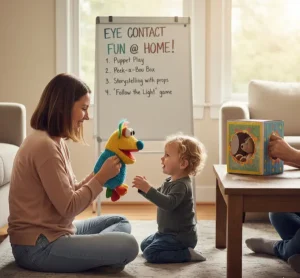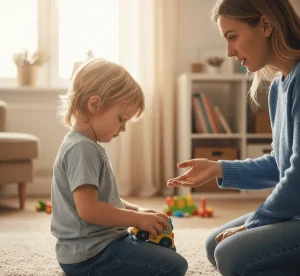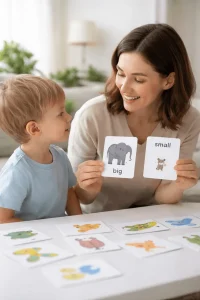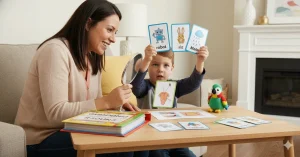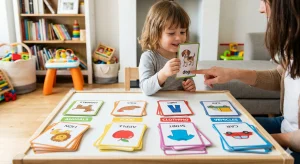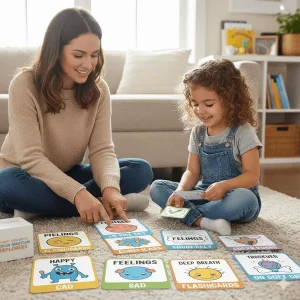Building Strong Coping Skills in Kids with Online Therapy
Last Updated: September 5, 2025
As parents, we all want our children to be resilient, capable of handling whatever life throws their way. But resilience isn’t something children are born with—it’s a skill they need to learn and develop over time. This is where coping skills come in. Coping skills are essential tools that help children manage their emotions, navigate challenges, and bounce back from setbacks. These skills are not only crucial for their current well-being but also lay the foundation for a healthy and balanced adult life.
In today’s digital age, online therapy has become a powerful and accessible way to help children build these vital coping mechanisms. Whether your child is dealing with anxiety, stress, or simply the everyday ups and downs of life, online therapy offers a flexible and personalized approach that meets them where they are. With the convenience of virtual sessions, children can engage with trained therapists in a comfortable environment, making it easier for them to open up and learn effective coping strategies.
Manage Your Child’s Behavior
Get expert help to manage tantrums, anger, or defiance. Online behavioral therapy that empowers better habits and emotional growth.
Understanding Coping Skills in Children
Every child encounters challenges, whether it’s dealing with school pressures, social interactions, or changes at home. How they respond to these situations largely depends on the coping skills they’ve developed. But what exactly are coping skills, and why are they so important in child development?
Coping skills are the strategies children use to manage difficult emotions and stressful situations. These skills enable them to handle frustration, disappointment, anxiety, and other challenging emotions in a healthy way. Without effective coping mechanisms, children may struggle to adapt, leading to increased stress, behavioral issues, or even long-term emotional problems.
Children face a variety of challenges that require strong coping mechanisms. From navigating peer relationships to dealing with academic pressure, they are constantly learning how to manage their emotions. For instance, a child who feels left out at school may need coping strategies to deal with feelings of rejection, while another who is overwhelmed by homework might benefit from techniques that reduce stress and improve focus.
The role of coping skills extends beyond just managing immediate challenges. These skills are foundational for emotional resilience—the ability to bounce back from setbacks and adapt to change. Children who develop strong coping mechanisms are better equipped to face the inevitable ups and downs of life, leading to improved mental health and well-being. They learn to view challenges not as insurmountable obstacles but as opportunities for growth and learning.
The Role of Online Therapy in Developing Coping Skills
In today’s fast-paced world, online therapy has emerged as a highly effective way to support children’s mental and emotional well-being. But how does it work, and why is it particularly suited to help kids develop strong coping skills?
Online therapy leverages digital platforms to connect children with licensed therapists through video calls, messaging, and interactive tools. Unlike traditional in-person therapy, online therapy offers a level of convenience and comfort that can be especially beneficial for kids. They can attend sessions from the comfort of their own home, which often makes them more relaxed and open to sharing their thoughts and feelings.
One of the key benefits of online therapy is its accessibility. Families living in remote areas or with tight schedules can easily access quality mental health care without the need to travel long distances. Additionally, online therapy is often more flexible, allowing for sessions that fit into the family’s routine. This flexibility is crucial for maintaining consistency, which is essential for children to effectively learn and practice coping strategies.
Another significant advantage is the personalized approach that online therapy can offer. Therapists can tailor their sessions to address the specific needs and challenges of each child. For instance, if a child struggles with anxiety, the therapist can focus on relaxation techniques and anxiety management strategies. If the issue is social anxiety, role-playing exercises can be incorporated to help the child practice social interactions in a safe environment.
Techniques Used in Online Therapy to Build Coping Skills
Online therapy uses several creative methods to help children learn strong coping skills. These approaches are designed to be fun and effective, making it easier for kids to understand and apply what they learn.
1. Interactive Games and Tools
Kids often learn best when they’re having fun. That’s why many online therapy sessions include interactive games and digital tools. These games teach coping strategies in an engaging way, helping children understand and manage their emotions through different scenarios. This makes the learning process enjoyable and helps the skills stick with them long after the session is over.
2. Role-Playing Scenarios
Role-playing is another useful technique in online therapy. It involves practicing real-life situations that kids might find difficult, like dealing with conflicts or speaking up in class. By acting out these scenarios with a therapist, children can gain confidence and develop practical coping strategies that they can use in their daily lives.
3. Mindfulness and Relaxation Exercises
Stress and anxiety are common in children, and online therapy often includes mindfulness and relaxation exercises to help manage these feelings. Techniques like deep breathing, guided imagery, and muscle relaxation can be practiced during sessions and used whenever children need to calm down. These simple exercises help reduce anxiety and improve focus in stressful situations.
4. Parental Involvement and Guidance
The success of online therapy also depends on what happens outside of the sessions. That’s why parental involvement is so important. Therapists often work with parents to provide guidance on how to reinforce coping skills at home. This might include practicing exercises together or encouraging the use of new skills. By staying involved, parents can help their children apply these coping mechanisms in everyday life.
Techniques Used in Online Therapy
| Technique | Description | Benefits for Children |
|---|---|---|
| Interactive Games | Engaging digital activities designed to teach coping strategies in a fun, interactive way. | Makes learning enjoyable and relatable, helping children absorb and retain new skills more effectively. |
| Role-Playing Scenarios | Simulated real-life situations where children practice responding to challenges, such as social interactions or handling conflicts. | Builds confidence and prepares children to handle similar situations in real life, reducing anxiety and improving problem-solving skills. |
| Mindfulness Exercises | Activities like deep breathing, guided imagery, and progressive muscle relaxation that help children manage stress and emotions. | Promotes relaxation, reduces stress, and improves focus, helping children develop tools to calm themselves in difficult situations. |
| Parental Involvement | Active participation by parents in reinforcing the coping strategies learned during therapy sessions. This can include practicing exercises together or providing consistent support. | Ensures that coping skills are practiced regularly at home, leading to stronger skill development and better long-term outcomes. |
Also read: Improve Articulation in Kids: Effective Role-Play Techniques
Challenges and Considerations in Online Therapy
Online therapy is a great way to help children build coping skills, but it does come with some challenges. Being aware of these potential issues can help make your child’s therapy experience more positive and effective.
1. Potential Barriers to Success
One common concern with online therapy is the amount of screen time involved. Many parents worry about their child spending too much time on digital devices, especially when they’re already using them for school and entertainment. Excessive screen time can lead to eye strain, tiredness, and difficulty staying focused.
Distractions at home can also be a challenge. Unlike a traditional therapy setting, where everything is designed to be calm and focused, home environments can be unpredictable. Things like siblings, pets, or background noise can easily disrupt a session, making it hard for your child to concentrate.
Another issue might be a lack of engagement. Some children find it harder to connect with a therapist through a screen compared to meeting in person. They might feel less comfortable opening up or may struggle with the structured format of online sessions.
2. Strategies to Overcome These Challenges
Fortunately, there are ways to address these challenges. First, it’s important to create a structured routine for therapy sessions. Consistency helps your child see therapy as a regular part of their schedule, making it easier for them to mentally prepare for each session.
You should also set up a quiet, distraction-free environment for the sessions. Choose a space in your home where your child can focus without interruptions. This might involve turning off other devices, keeping pets in another room, and informing family members that this time is reserved for therapy.
Practical Tips for Parents
Supporting your child’s journey through online therapy is not just about the sessions themselves—it’s about what happens in between. As a parent, you play a crucial role in helping your child practice and reinforce the coping skills they learn. Here are some practical tips to ensure that your child gets the most out of their online therapy experience.
1. Supporting Your Child’s Progress in Online Therapy
One of the most effective ways to support your child’s progress is to stay involved in the process. This doesn’t mean sitting in on every session, but rather being aware of the goals your child is working toward and the strategies being used. Regularly check in with your child to see how they feel about their therapy and what they’ve been learning. Your interest and encouragement can make a big difference in their motivation and commitment.
It’s also helpful to maintain open communication with your child’s therapist. By understanding the specific coping strategies being taught, you can better reinforce these skills at home. If your child is learning techniques to manage anxiety, for example, you can gently remind them to use these strategies when stressful situations arise. This collaboration between therapist and parent ensures that the therapy extends beyond the screen and into your child’s everyday life.
Also read: Tips for Preparing Your Child for Their First Virtual Therapy Session
Encouraging the Practice of Coping Skills Outside of Therapy
Consistency is key when it comes to developing strong coping skills. Encourage your child to practice what they’ve learned during therapy sessions in their daily routines. This might include setting aside time for mindfulness exercises, using role-play to navigate social situations, or simply having regular discussions about their feelings.
Creating a supportive environment at home can make a big difference. For example, if your child is working on managing anger, you can set up a designated “cool down” space where they can go to relax and use their coping strategies. Reinforcing these practices outside of therapy helps your child internalize the skills and makes them more likely to use them when it matters most.
Resources and Tools Available to Parents
To better support your child, you can tap into the wide range of resources available through Wellness Hub. From mindfulness guides to practical tips on managing screen time, Wellness Hub offers parents helpful tools and articles to better understand and assist in their child’s therapy journey. These resources provide both valuable insights and everyday strategies you can use at home.
In addition, Wellness Hub provides the BASICS App and an interactive online platform that feature engaging activities and exercises tailored to your child’s therapy goals. These tools transform practice into fun, making it easier for children to build coping skills while staying motivated and involved.
Conclusion
Building strong coping skills in children is crucial for their emotional well-being and resilience. These skills help kids handle life’s challenges, manage stress, and grow into healthy, confident adults. Online therapy offers an effective and convenient way to support children in developing these important skills. With its accessibility and personalized approach, online therapy allows families to get the help they need from the comfort of home.
If you’re looking for a way to help your child build stronger coping mechanisms, online therapy is a great option. At Wellness Hub, we offer tailored online therapy services designed to meet your child’s unique needs. Whether your child is dealing with anxiety, stress, or just needs help managing everyday challenges, our experienced therapists are here to support them. Explore how our online therapy services can make a positive difference in your child’s life today.
Frequently Asked Questions:
1. What are coping skills, and why are they important for children?
Coping skills are strategies that children use to manage their emotions and navigate difficult situations. These skills are crucial for helping kids handle stress, build resilience, and develop a positive outlook on life.
2. How can online therapy help my child develop better coping skills?
Online therapy provides a safe and convenient environment where children can learn and practice coping strategies. Therapists use interactive tools, role-playing, and mindfulness exercises to teach kids how to manage their emotions and deal with challenges effectively.
3. What are the benefits of choosing online therapy over in-person sessions for children?
Online therapy offers several benefits, including greater accessibility, flexibility in scheduling, and the comfort of being in a familiar environment. This makes it easier for children to open up and engage with their therapist, leading to more effective outcomes.
4. What challenges might my child face during online therapy, and how can they be overcome?
Common challenges in online therapy include screen time limits, distractions at home, and potential engagement issues. These can be overcome by setting a structured routine, creating a quiet environment, and ensuring that your child is comfortable and focused during sessions.
5. How can I support my child’s progress in online therapy?
As a parent, you can support your child by staying involved in their therapy journey, encouraging the practice of coping skills at home, and communicating regularly with the therapist. Using resources and tools provided by Wellness Hub can also help reinforce these skills.
6. What types of coping skills are taught in online therapy sessions?
Online therapy sessions often teach coping skills such as emotional regulation, stress management, mindfulness, and effective communication. These skills help children handle a variety of situations, from managing anxiety to dealing with social challenges.
7. Is online therapy suitable for all children?
Online therapy can be effective for most children, but it’s important to consult with a therapist to determine the best approach for your child’s specific needs. At Wellness Hub, our therapists tailor sessions to meet each child’s unique challenges and goals.
8. How do I know if my child is making progress in online therapy?
Progress in online therapy can be observed through improved emotional regulation, better handling of stressful situations, and positive changes in behavior. Regular communication with your child’s therapist can also provide insights into their development.
9. How long does it take for children to develop coping skills through online therapy?
The time it takes for children to develop coping skills through online therapy can vary depending on their individual needs and challenges. Some children may see improvements in a few weeks, while others may take several months. Consistency in therapy sessions and practice at home are key factors in achieving lasting results.
10. Can parents participate in their child’s online therapy sessions?
Yes, parental involvement is often encouraged in online therapy, especially for younger children. Parents can play a vital role in reinforcing the coping skills taught during sessions and supporting their child’s progress. Therapists may also provide guidance to parents on how to continue practicing these skills at home.
About Author:
Lasya Vooturi,
Clinical Psychologist (A) & Behavioral Therapist
Lasya holds a Professional Diploma in Clinical Psychology from Amity University, where she deepened her understanding of psychological principles from March 2023 to March 2024. With over a year of dedicated experience as a Behavioral Therapist, Lasya has honed her skills in applying effective therapy techniques tailored to individual needs. Fluent in Telugu, Hindi, and English, she is adept at connecting with a diverse range of clients, ensuring comprehensive communication and understanding. Lasya’s approach is grounded in empathy and scientific rigor, making her a trusted ally in navigating mental health challenges.
Book your Free Consultation Today
Parent/Caregiver Info:
Client’s Details:
* Error Message
